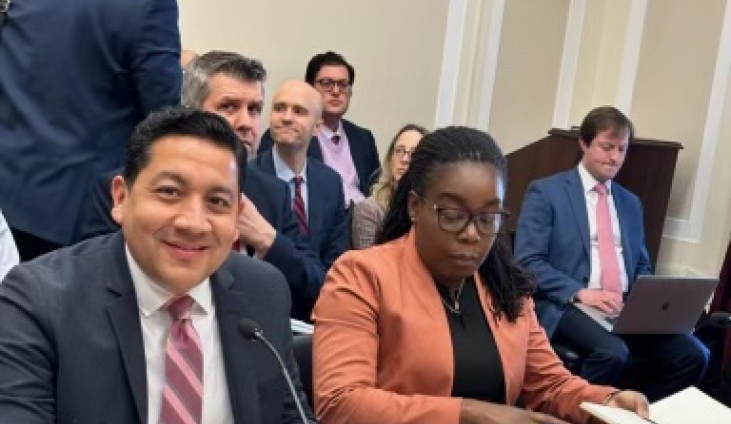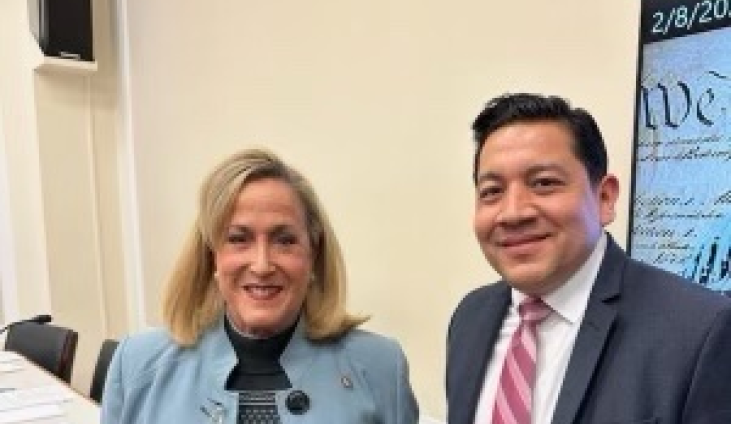On February 8, 2023, Science Center Capital Advisor Eli Velasquez testified before the House Financial Services Capital Markets Subcommittee as a Board Member of the Angel Capital Association on the need for reform to the Accredited Investor definition. The proposed reform would enable broader access for more underrepresented individuals to participate as angel investors.
Testimony of Eli Velasquez
Founder & Managing Partner, Investors of Color Founder & CEO, Capital Stack Investors
On behalf of Angel Capital Association House Committee on Financial Institutions
“Sophistication or Discrimination? How the Accredited Investor Definition Unfairly Limits Investment Access for the Non-wealthy and the Need for Reform."
Chairman McHenry, Ranking Member Waters, and distinguished members of the Committee, thank you for the opportunity to testify before the Committee this morning. My name is Eli Velasquez, and I appear today on behalf of Angel Capital Association (ACA), where I serve on the Board of Directors.
ACA is a professional society of accredited angel investors who make up the world's most prolific early-stage investment class. We represent more than 15,000 accredited angel investors and 250 angel groups, accredited platforms, and family offices. Together, we deploy more than $650 million in early-stage capital every year, supporting more than 30,000 entrepreneurial companies in our investment portfolios.
My own professional journey illustrates the importance of reducing barriers to entry for becoming an accredited investor.
After graduating from Boston University with a Mechanical Engineering degree and having worked as an engineering summer intern with the Ford Motor Company in Claycomo, MO, I began working for the Boeing Company in Huntington Beach, CA. The merger between Boeing and McDonnell Douglas was recently inked and I was brought in as an Engineer/Scientist to assist with the design, development and launch of a new family of the Delta III and Delta IV rockets. We had both public and private clients seeking to launch military and commercial satellites. As one of the youngest engineers, I was assigned to oversee several systems in the second stage of the rocket, which is the portion that places the satellites into orbit.
While working full-time, I decided to attend law school at night. I enrolled at Whittier Law School in Costa Mesa, CA, and in addition to taking additional courses to obtain an Intellectual Property Certificate, I also became a Lead Editor for the Whittier Law Review and am a published author in the law review (see, Velasquez, Eli. 2003. "The Shaping of an American Consensus against the Execution of Mentally Retarded Criminals." Whittier Law Review 24 (summer): 955–83). Two years into law school, I transitioned my full-time day job in engineering to Boeing’s Intellectual Property Business Unit, evaluating hundreds of inventions and technologies for commercial potential. It was also during my time in southern California that I first heard the term “angel investor.” I had a wealthy friend and successful entrepreneur who told me about his involvement with a group in southern California and the wealth and income requirements to be an angel. Hearing his recount, I felt like being an angel investor was completely unattainable for me.
After graduating from law school in 2005, I made a personal decision to move back to my hometown of El Paso, TX to put my engineering and law degrees to use. I co-founded a bi-national technology incubator called the Bi-National Sustainability Laboratory (BNSL), which aimed to commercialize technologies on both sides of the US-Mexico border in order to promote technology based economic development. The project was funded by the US Economic Development Administration, the US-Mexico Foundation for Science (FUMEC), CONACyT (Mexico’s version of the NSF), and other state and local partners. Through this work, I worked with over 200 early-stage companies, investors and partners in supporting the commercialization of technologies from universities, federal labs and local inventors.
Thereafter, I helped lead the Trans-Pecos/El Paso and West Texas Regional Centers for Innovation & Commercialization (RCIC). The aim of the organization was to vet deals and research opportunities for funding from the $200M Texas Emerging Technology Fund (ETF). I oversaw 93 counties across Texas in this role. During this work, I also started to support the management of the El Paso angel investor group called the Camino Real Angels. I would find, screen, vet, conduct due diligence and present investment opportunities to the angel group and/or the ETF. Yet again, I evaluated hundreds of investment opportunities, and was only in a position to pass them on without any opportunity to participate even where there was no conflict of interest.
What I did not realize then, but is clear today, is that despite El Paso being a city with an over 80% Hispanic population, all of the members of the angel group were older, white males. There was a notable exit that resulted through the Camino Real Angels, and a few members made 10x on their money. One particular member noted that he had received a check in the mail for $450,000 for his investment of $45,000 a few years earlier. This level of wealth within this asset class was unimaginable to me. It became clear to me at this point that the ability to make this type of money was reserved to a select few who were part of an unspoken club.
I transitioned my role to help lead the technology transfer office for the Texas Tech University System in Lubbock, TX under now Congressman Jodey Arrington. I co-founded the Lubbock Angel Group in 2015. The community had decades of failed attempts to start an angel group, and despite being a rural community with a population of about 250,000, we launched a coordinated effort amongst the university, local economic development and state support to form a group which has invested over $5M across more than 30 companies to date with a handful of exits. One thing to highlight is that Lubbock has nearly the opposite demographics of El Paso, having about an 80% white population. As you can imagine, our group was also predominantly older, white males.
At this stage in my career, I had evaluated thousands of deals, vetted hundreds as viable investment opportunities and partnered with dozens of angel and venture investors and, still, I could not participate despite now being more financially secure and only about $20,000 from the accredited investor income threshold. One particular member in our group was a young twenty-something professional who was brand new to angel investing. Despite not having any experience in angel investing, he leveraged his family’s trust fund to achieve accredited investor status. He began writing checks and achieved a couple exits within a couple of years, enough so to buy a new house and put his kids in private school. I could not help but feel downtrodden to see wealth simply pass me up so easily despite my deep expertise in the angel investing space and accredited investor status so close within reach.
I subsequently accepted a new role in Massachusetts where I helped a nonprofit design and deploy the US State Department GIST Investors program. I had the opportunity to launch, support and train angel groups in the Middle East, Latin America and Southeast Asia. It was eye-opening to see how these communities would develop inclusive approaches to get as many investors trained and engaged in angel investing. It was through this work that the idea sparked to found Investors of Color in the US. It was also at this stage in 2020, over 20 years since my days as a rocket scientist, IP expert, nonprofit founder, university executive, founder of angel groups all over the world and evaluater of tens of thousands of deals that I was finally . . . finally able to write my FIRST check as an accredited investor.
Twenty-two years. I have missed a generation’s worth of investment opportunities, because I could not participate in the accredited investor asset class. What if I had formal investor education, investment safeguards according to my income or net worth and professional organizations to mentor me through the investor journey twenty-two years ago. How many exits could I have had? How many small businesses in southern California, El Paso, Lubbock, Massachusetts and even Claycomo, Missouri could I have invested in? How many jobs could I have helped create? How many more nonprofit organizations could I have donated to? How much more would I have been able to contribute to the economy?
I mentioned the organization, Investors of Color, which I co-founded in 2021 alongside my business partner, who currently also serves as the CEO of BLCK VC. We formed Investors of Color as a national network of diverse accredited investors across the capital stack committed to building wealth for and by underrepresented communities through education and syndicated investments into early-stage companies. We have a database of over 800 investors representing the entire continuum of capital such as angel investors, ad-hoc investment networks, venture capital, revenue-based investment firms, family offices, and other capital providers. Our aim to support companies and business models that benefit the health, wealth and social mobility of communities of color.
Through my personal experience and work building Investors of Color, I have learned that in order to mobilize more capital and engage more underrepresented individuals into angel investing, we need to reduce the barriers to entry for becoming an accredited investor. With more capital being deployed by angel investors, we know that we can also increase the economic impact across the US. Research conducted by member groups of the Angel Capital Association shows that for every dollar invested by angel investors it results in a 21x Return on Investment in economic impact.
We can reduce barriers through formalized education and professionalization of this asset class. There are steps we can take today through policy reform that can help increase the number of accredited investors. These reforms include:
- Amend the Accredited Investor Definition (Proposed Bill H.R. 3328). Codify the definition of “accredited investor” to include certain licenses or possessing qualifying education or experience, thus expanding investment opportunities for sophisticated-but-not-yet-wealthy investors and providing private companies additional sources of funding.
- Formalize Investor Education (Proposed Bill H.R. 4776). Direct the SEC to create an examination that individuals can take to be certified as an accredited investor. Provide investor training for any individual who is certified as an accredited investor through an examination established by the Commission that— (i) ensures that an individual certified as an accredited investor pursuant to such examination understands and appreciates the risks of investing in private companies; (ii) is designed to ensure that an individual with financial sophistication or training would be unlikely to fail; and (iii) may be administered by a registered national securities association
- Require Additional Certifications (Proposed Bill H.R. 4708). Require SEC to incorporate additional “certifications, designations, or credentials that further the purpose of the accredited investor definition” within 18 months, and thereafter assess the addition of certifications, designations or credentials every 5 years.
- Require Self Certification (Proposed Bill H.R. 4753). Require the SEC to create a form that would allow for individuals to certify that they are sophisticated and understand the risks of investment in private offerings.
- Implement Investment Safeguards (Proposed Bill H.R. 9405). Require any individual whose aggregate investment in securities for which there has not been a public offering is not more than 10% percent of the greater of (I) the net assets of the individual; or (II) the annual income of the individual.
- Do not increase the current required accredited investor income thresholds.
- Require membership into a professional investor organization such as the Angel Capital Association, the National Venture Capital Association, or other sanctioned organization.
My colleagues and I are ready and willing to serve as resources of information and feedback as you pursue legislative solutions to making capital more readily available to our nation’s entrepreneurs. Thank you again for this opportunity to share my experience with you. I look forward to your questions.




